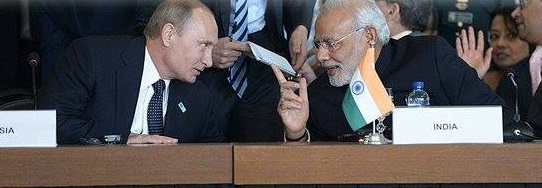 http://indianembassy.ru
http://indianembassy.ru
India Will Complicate the United States’ Russia Policy
by ASP Junior Adjunct Fellow Ricky Gandhi
India Will Complicate the United States’ Russia Policy
India’s rise as a global geopolitical force has garnered worldwide attention, especially by the United States and Russia. Both countries see India as not only a prominent economic partner, but a military one as well. As a result, both countries have greatly increased their outreach to New Delhi.
As I’ve argued in a longer piece, the U.S.’ outreach will come with a few caveats. The U.S. should understand that India will not completely abide by Western institutions and norms since its geopolitical outlooks more closely matches that of Russia. Secondly, closer relations with a strong India will mitigate hawkish Russian policies.
The Nehru Doctrine
Understanding these points first requires one to understand India’s history. A 5,000+ year history provides the narrative of a unique and exceptional India. In addition, British colonial rule and gaining independence in the 20th century have led to India obsessing over autonomous rule.
Supplementing those concepts, India’s first Prime Minister, Jawaharlal Nehru, developed the principle of non-alignment and the objectives for Indian foreign policy:
“[India] has tried to combine idealism with national interest. The main objectives of that policy are: the pursuit of peace, not through alignment with any major power or group of powers, but through an independent approach to each controversial or disputed issue; the liberation of subject peoples; the maintenance of freedom both national and individual; the elimination of want, disease, and ignorance, which afflict the greater part of the world’s population.”
The Nehruvian philosophy still persists to this day throughout the Indian foreign policy realm. As such, India has strived to become a major global power. This desire for global influence mixed with autonomy causes New Delhi to seek a more diffused system of global governance, i.e. a multipolar world.
A Multipolar World
Similarly, Russia also advocates for a multipolar world. This entails both powers exerting influence in their respective spheres of influence and opposing foreign intervention in another country’s affairs. Both Russia and India also wish to have more influence at global forums, such as the United Nations (UN) while promoting alternative institutions that sometimes challenge Western ones.
BRICS, for instance, aims to provide an alternative to the International Monetary Fund (IMF) and the World Bank. They also take stances on geopolitical issues at odds with Washington. Notably, they have condemned Western Sanctions against Russia and military intervention in the Middle East.
India’s growing economic influence couples with growing defense interests. It has become the fifth largest military spender in the world, with Russia accounting for nearly two-thirds of arms exports to India in 2015-2016. While the United States has increased its share, a few hurdles still exist.
First, Russian products generally cost less. Second, American defense deals come with more restrictions and requirements that India feels challenges its autonomy. Third, though highly unlikely, the possibility that the U.S. Congress can cancel a sale at any time makes India weary.
The preference for dealing with the Russians became even more apparent after signing a package of economic and defense deals in 2016. This included joint ventures in developing Russian military equipment in India and cooperation in the infrastructure and energy sectors.
The $8 billion defense and economic ties help improve Russia’s economy at a time when Western sanctions have restricted capital flows. At the same time, it enhances their relationship, undoubtedly contributing to India’s condemnation of sanctions and not condemning Russian actions in Syria and Ukraine.
Moving Forward
In short, Russian-Indian relations will continue to strengthen, and this could mitigate the impacts of our policy towards Russia. So what does this mean moving forward? It certainly does not mean changing our stance towards India. India is one of the fastest growing economies in the world and a vital defense partner. We should continue to improve military and economic ties with India while building personal trust.
As for Russia, the U.S. could either maintain the status-quo or alter its strategy. The former has only led to worsened relations, so future administrations should at least consider crafting policies based on pragmatism rather than ideology.
Finally, the U.S. must prepare for and embrace a multipolar world. Instead of viewing competition as a threat, Washington should instead seek to collaborate with these institutions so they can provide as much input as possible.
These changes will not come easily, but failure to adapt will wane Washington’s influence in the world. On the other hand, adapting to this new reality will increase the U.S.’ economic outlook and allow it to better promote its interests.
For my more in-depth analysis on the U.S.-India-Russia trilateral relationship published by the Center on Global Interests, click here.





